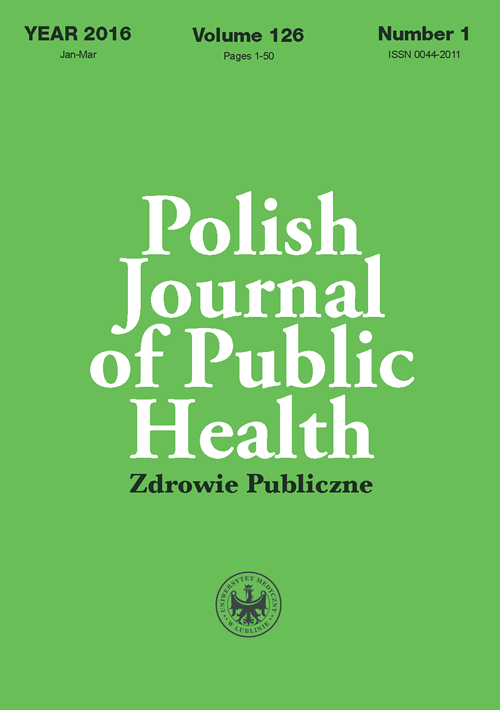A comparison of the levels of satisfaction with the medical services provided by primary healthcare centers in selected communes
DOI:
https://doi.org/10.1515/pjph-2016-0002Keywords:
quality, satisfaction, public primary healthcare, non-public primary healthcareAbstract
Introduction. Family medicine remains the primary type of medical services in Poland and it is supposed to treat both individual patients and the society as a whole. Due to the growing commercialization of the health service, most primary healthcare centers have transformed into non-public healthcare facilities. The public ones (called SPZOZ in Polish) account only for a small fraction of the whole number of primary healthcare facilities. The quality of medical services provided by such facilities, as patients see it, remains one of the key elements determining the development of family medicine centers.
Aim. The aim of this paper was to assess patient satisfaction levels regarding the healthcare services they received in two primary healthcare institutions, both of the NZOZ and SPZOZ type, in a small town located close to Lublin.
Material and methods. An anonymous survey was filled out by 30 patients of both a public and non-public healthcare center located in Niemce (Niemce Commune, Lublin District). The quality of services was assessed using an original questionnaire in the form of a poll.
Results. The results obtained indicate a clear relationship between one’s trust to the physician, diagnosis accuracy and visiting the particular center again, in order to continue the treatment. For older subjects, it was nurses’ kindness and politeness that was the most important. The elderly appreciated the kindness and politeness of the nurses in particular. No significant differences were found between the institutions in respect of the overall perception of satisfaction with services. In terms of infrastructure assessment, the majority of positive feedback was provided for NZOZ.
Conclusions. The findings above suggest that it is essential to conduct surveys on a regular basis, in order to check patients’ assessment of the service quality in various institutons.
References
1. Gruszczyński L. Kwestionariusze w socjologii. Budowa narzędzi do badań surveyowych. Wyd. 4 zmienione. Katowice; 2003.
2. Watała W. Biostatystyka – wykorzystanie metod statystycznych w pracy badawczej w naukach biomedycznych. Alfa-medica Press; 2002
3. Kulczycka K, Stychno E, Wdowiak L. Publiczne i niepubliczne zakłady podstawowej opieki zdrowotnej w opinii pacjentów. Ann UMSC sectio D. 2004;LIX(Suppl. 14):262-6.
4. Windak A, Panasiuk L. Medycyna rodzinna w systemie ochrony zdrowia. Zdr Publ. 2005;115(3):267-73.
5. Miller M, Supranowicz P, Gębska-Kuczerowska A, et al. Ocena poziomu satysfakcji pacjentów jako element jakości pracy podstawowej opieki zdrowotnej. Pol Merk Lek. 2007;XXIII(137):367-70.
6. Marcinowicz L, Konstantynowicz J, Chlabicz S. The patient’s view of the acceptability of the primary care in Poland. In J Quality Health Care. 2008;20(4):277-83.
7. Marcinowicz L, Chlabicz S. Improvement in the accessibility and organization of services of family physicians in a small town in Poland: a comparison of patient opinions between 1998 and 2002. Adv Med Scie. 2006;52:226-31.
8. Steć A, Wołyniak M, Wdowiak L. Satysfakcja pacjentów z usług świadczonych przez wybrane niepubliczne zakłady opieki zdrowotnej. Probl Hig Epidemiol. 2007;88(3):272-6.
9. Marcinowicz L, Górska A, Chlabicz S. Przyczyny niezadowolenia pacjentów z opieki lekarza rodzinnego w świetle badań ankietowych – analiza odpowiedzi na pytania otwarte. Prz Lek. 2007;64(9):559-62.
10. Łukomska A, Rość D, Faleńczyk K. Satisfaction of patients treated by a family doctor. Fam Med Prim Care Rev. 2008;10(2):167-72.
11. Marcinowicz L, Grębowski R. Ocena opieki lekarza rodzinnego w świetle badań jakościowych: poszukiwanie komponentów zadowolenia i niezadowolenia pacjentów. Fam Med Prim Care Rev. 2008;10(2):173-9.
12. Nowakowski B. Assurances sociales. In: M. Kacprzak. L’hygiene publique en Pologne. Warszawa: “Siła”; 1933. p. 208-22.
13. Borek-Wojciechowska R, Kłokow S. Dostępność świadczeń podstawowej opieki zdrowotnej jako jeden z aspektów jakości opieki. Zdr Publ. 2007;117(3):381-5.
14. Bojar I, Ostrowski T, Wdowiak L. Satysfakcja pacjentów z usług podstawowej opieki zdrowotnej w mieście Lublin. Ann UMCS sectio D. 2004;LIX(Suppl. 14):185-9.
15. Łukomska A. Dostępność świadczeń lekarza rodzinnego w ocenie pacjentów. Fam Med Prim Care Rev. 2008;10(2):162-6.
16. Kulczycka K, Stychno E, Wdowiak L. Satysfakcja pacjentów korzystających z usług podstawowej opieki zdrowotnej po przeprowadzonej reformie ochrony zdrowia. Ann UMSC sectio D. 2004;LIX(Suppl. 14):267-70.
17. Pietryka-Michałowska E, Wdowiak L, Szymańska J. Lekarz pierwszego kontaktu w opinii pacjentów. Cz. II Oczekiwania pacjentów. Zdr Publ. 2006;116(2):250-4.
18. Bojar I, Wdowiak L, Osrtowski T, et al. Dostępność poradni POZ w Lublinie w opinii pacjentów. Zdr Publ. 2004;114(3):304-6.
19. Pietryka-Michałowska E, Wdowiak L, Szymańska J. Lekarz pierwszego kontaktu w opinii pacjentów. Cz. II Oczekiwania pacjentów. Zdr Publ. 2006;116(2):250-4.
20. Pyra K, Raganowski P, Jabłońska J, et al. Ogólna ocena usług medycznych oferowanych przez Zakłady Podstawowej Opieki Zdrowotnej w opinii pacjentów. Ann UMCS sectio D. 2007;62(Suppl. 18):275-9.
21. Misiuna M. Zmiany ocen opieki zdrowotnej i ich społeczne zróżnicowanie. Zdr Publ. 2005;115(3):296-302.
22. Glynn LG, Byrne M, Newell J, et al. the effect of health status on patients’ satisfaction with out-of-hours care provided by a family doctor co-operative. Fam Pract. 2004;21:677-79.
23. Montaglione CJ. The physician-patient relationship: comerstone of patient trust, satisfaction and lojalisty. Manag Care Quart. 1999;7(3):5-22. [http://www.mz.gov.pl/]
24. Coulter A. The Autonomous Patient. Ending paternalism in medical care. London: The Nuffield Trust; 2003. p. 106-21.
Downloads
Published
Issue
Section
License
Copyright (c) 2016 Polish Journal of Public Health

This work is licensed under a Creative Commons Attribution-NonCommercial-NoDerivatives 3.0 Unported License.


